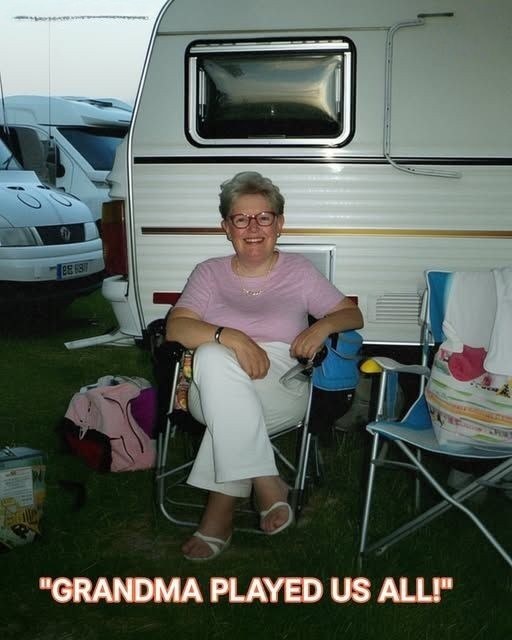My grandmother lived quietly for years in that old, creaky trailer at the edge of town. To everyone else, she was just Grandma: soft-spoken, thrifty, always ready with a batch of cookies or a gentle story. After she passed, my husband Bernard surprised me by practically rubbing his hands together in anticipation of a hidden fortune. He’d heard whispers—family gossip that Grandma was secretly wealthy—and he was certain her will would prove it.
When the lawyer called us in for the reading, Bernard practically leapt out of his seat. But the will held no grand bank accounts, no beachfront property, not even the trailer in her name—she’d sold it months before to her lifelong friend, Erna, who lived next door. Grandma had enjoyed a modest monthly payment in exchange, which she quietly used to fund weekend excursions: a two-day bus trip to visit cousins, a single-night stay in a beach cabin, and small daylong drives to scenic overlooks. She hadn’t starved for adventure—she’d merely chosen to spend her final years savoring life’s simple joys.
As the lawyer rifled through the papers, he paused with a final envelope addressed to me, sealed with Grandma’s neat cursive handwriting and a request to open it in private. Bernard grew impatient, demanding the attorney “double-check” for hidden assets, but the lawyer only shook his head. There was no secret fortune buried in paperwork.
At home, Bernard hovered as I clutched the envelope. His excitement had dulled to desperation—there had to be a hidden windfall in those last words. I felt uneasy reading her letter within his gaze, so I asked for a moment alone. He grudgingly agreed but warned, “If there’s money in that letter, we split it fifty-fifty.”
In the quiet of our living room, I unfolded the note. Grandma’s message was direct and warm: she apologized for the confusion over money, reminded me that life’s value isn’t measured in bank balances, and warned against letting greed poison my heart. Then she revealed one final gift—a small treasure buried beneath the oak tree behind her former trailer. My curiosity leapt at her instructions: “Go there, dig a little, and you’ll find something special to cherish.”
The next morning, I drove to Erna’s place. The two women embraced as if parted only yesterday, and Erna led me to the sprawling old oak whose roots spread like grandmother’s arms. With a trowel in hand, I unearthed a weathered metal box. Inside were black-and-white photographs of Grandma in her youth—smiling on a seaside pier, laughing with friends at a county fair—along with pictures of me as a child, hugging her around the waist. My throat tightened as I recognized the warmth in her eyes.
Beneath the photos lay a notebook filled with her handwriting: favorite recipes scrawled in the margins, snippets of poetry, reflections on mornings spent watching sunrises. Page after page, I felt her guiding hand, as if she were whispering memories back to me. Tucked at the notebook’s end was a tiny envelope holding a single key on a wooden fob and one last note: it unlocked her lakeside cottage—the sanctuary she’d bought outright with decades of quiet savings, a place she never mentioned because it was hers alone to breathe in.
When I told Bernard about the cottage, his eyes lit up at the prospect of property—until we arrived at the humble two-bedroom cabin. It had creaky pine floors, a stone hearth, and a patch of wildflowers edging a small lake. He scoffed at its modest value and muttered about resale. In that moment, I saw clearly that our priorities had diverged: he was counting dollars, while I was counting moments.
Over the following months, I poured myself into restoring the cottage: painting walls in soft pastels, planting heirloom vegetables, and arranging Grandma’s notebook and photos on a shelf above the fireplace. Bernard joined me at first, but his patience thinned as no quick profit emerged. He retreated to the city; I found peace by the lake.
Alone in that cabin, I honored Grandma’s legacy every day. I cooked her recipes for neighbors, recorded my thoughts in a new journal, and watched fiery sunsets that mirrored her spirit. Eventually, I realized that love of place can be more sustaining than any bank balance.
When Bernard and I finally separated, the decision felt less like failure and more like liberation. With the cottage fully in my name, I had a foundation built on intention rather than speculation. I opened its doors to weary travelers seeking quiet respite, naming it “Grandma’s Heart.” Guests came to fish at dawn, read by the hearth, and wander forest trails illuminated by fireflies. Their gratitude reminded me of what truly mattered—kindness, quiet beauty, and a home that holds our memories.
Grandma’s final gift wasn’t cash or land alone; it was the wisdom that true wealth is measured in moments shared, stories passed on, and the places that let our souls soar. In that lakeside cottage, I carry her love forward, teaching others what she taught me: that when life seems small, joy can still overflow.
